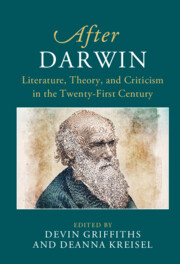Book contents
- After Darwin
- After Series
- After Darwin
- Copyright page
- Contents
- Figures
- Contributors
- Chapter 1 Introduction
- Part I Environments after Darwin
- Chapter 2 Darwin after Nature
- Chapter 3 Darwin and Animal Studies
- Chapter 4 Darwin’s Birdsong
- Chapter 5 Darwin and the Anthropocene
- Part II Differences after Darwin
- Part III Humanism after Darwin
- References
- Index
Chapter 3 - Darwin and Animal Studies
from Part I - Environments after Darwin
Published online by Cambridge University Press: 01 December 2022
- After Darwin
- After Series
- After Darwin
- Copyright page
- Contents
- Figures
- Contributors
- Chapter 1 Introduction
- Part I Environments after Darwin
- Chapter 2 Darwin after Nature
- Chapter 3 Darwin and Animal Studies
- Chapter 4 Darwin’s Birdsong
- Chapter 5 Darwin and the Anthropocene
- Part II Differences after Darwin
- Part III Humanism after Darwin
- References
- Index
Summary
The interdisciplinary field of animal studies owes much to Darwin’s work, particularly in the Descent of Man, where he claims that mental and emotional capacities ranging from an ability to reason to an aesthetic sense exist in other animals besides humans. This chapter examines the significance of Darwin’s work for animal ethics, the science of animal behavior, theories of companion species, and the age of mass extinction. Activists, scientists, humanists, and environmentalists continue to find new uses for Darwin’s work as they pursue greater knowledge about the animal kingdom and more just ecological communities.
Keywords
- Type
- Chapter
- Information
- After DarwinLiterature, Theory, and Criticism in the Twenty-First Century, pp. 33 - 44Publisher: Cambridge University PressPrint publication year: 2022

